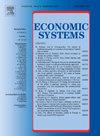全球化促进非洲结构转型的终身性别包容教育
IF 3.3
2区 经济学
Q1 ECONOMICS
引用次数: 0
摘要
本研究旨在探讨全球化与终身性别融合教育对结构转型的相关性。这项研究的重点是非洲41个国家,使用了2004年至2021年的数据。采用广义矩量法(GMM)对交互回归范围内的问题表述进行评价。性别包容性终身学习被衡量为在三个教育阶段获得的性别包容性教育,特别是:小学、中学和大学包容性教育阶段。总全球化和相应的组成部分(社会、经济和政治动态)被用作调节因素。经济(即贸易和金融)和社会(即人际、信息和文化)全球化的附属子组件也用于稳健性目的。全球化和性别包容性终身学习各自影响结构转型的假设未得到验证。此外,全球化动态调节终身性别全纳教育促进结构转型的假设也未得到验证。澄清了为什么这些假设没有得到验证。讨论了政策影响。本文章由计算机程序翻译,如有差异,请以英文原文为准。
Globalization in lifelong gender inclusive education for structural transformation in Africa
The present study examines the relevance of globalization in lifelong gender inclusive education for structural transformation. The focus of the research is on 41 countries in Africa using data from 2004 to 2021. The generalized method of moments (GMM) is employed to assess the problem statement within the remit of interactive regressions. Gender inclusive lifelong learning is measured as gender inclusive education acquired during the three levels of education, notably: primary, secondary and tertiary inclusive education stages. Total globalization and corresponding components (social, economic and political dynamics) are employed as moderators. The attendant sub-components of economic (i.e., trade and financial) and social (i.e., interpersonal, informational and cultural) globalization are also employed for robustness purposes. The hypotheses that globalization and gender inclusive lifelong learning individually influence structural transformation are not validated. Furthermore, the hypothesis that globalization dynamics moderate lifelong gender inclusive education to promote structural transformation is also not validated. Clarification as to why the hypotheses are not validated is provided. Policy implications are discussed.
求助全文
通过发布文献求助,成功后即可免费获取论文全文。
去求助
来源期刊

Economic Systems
ECONOMICS-
CiteScore
4.90
自引率
0.00%
发文量
83
审稿时长
48 days
期刊介绍:
Economic Systems is a refereed journal for the analysis of causes and consequences of the significant institutional variety prevailing among developed, developing, and emerging economies, as well as attempts at and proposals for their reform. The journal is open to micro and macro contributions, theoretical as well as empirical, the latter to analyze related topics against the background of country or region-specific experiences. In this respect, Economic Systems retains its long standing interest in the emerging economies of Central and Eastern Europe and other former transition economies, but also encourages contributions that cover any part of the world, including Asia, Latin America, the Middle East, or Africa.
 求助内容:
求助内容: 应助结果提醒方式:
应助结果提醒方式:


